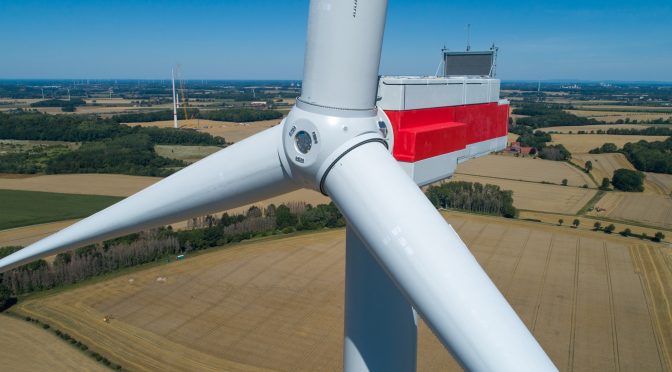New state-of-the-art Artificial Intelligence (AI)/Machine Learning (ML) technology developed by GE scientists recognized with a prestigious Manufacturing Leadership Award (MLA) by the National Association of Manufacturers
GE’s AI/ML tool uses a digital twin of the wind turbine logistics process to accurately predict and streamline logistics costs
Application of AI/ML could enable a 10% reduction in logistics costs, which would represent a global cost savings to the wind industry of up to $2.6 billion annually by 2030 based on current industry growth projections.
GE Research, in collaboration with GE Renewable Energy, has developed a cutting-edge AI/ML tool that could save the global wind industry billions of dollars in logistics costs over the next decade; it has been recognized by the National Association of Manufacturers (NAM) with the 2022 prestigious Manufacturing Leadership Award. GE Research is proud to receive this award and building on its recognized leadership in developing advanced digital technology for improving supply chain management.
The Manufacturing Leadership Awards are presented annually by NAM’s Manufacturing Leadership Council, to recognize top operational and technology leadership in manufacturing. Award winners are selected from an independent panel of industry executive experts and peers. GE’s new AI/ML tool was recognized in the AI/ML category. Click here to read more about the awards, which will be formally presented at the Councils annual leadership Summit being held in Marco Island, Florida, from June 27-29.
Peter Koudal, Digital Supply Chain Innovation Leader at GE Research, said the recognition from NAM is a strong testament to the new AI/ML tool vast potential and impact stating, “Over the 10- month period we developed, tested and calibrated this new AI/ML analytics system in 2021, we saw significant improvements in our ability to predict and streamline our logistics planning for new wind turbine deliveries,” Koudal said. “The wind supply chain can be highly variable with the destination of customer sites and sources of supply changing frequently and the wind turbine product continually changing as new innovations of larger and more capable components aimed at lowering the levelized cost of electricity (LCOE) occur. Using GE’s AI/ML analytics systems, we will be able to reliably understand and predict the cost of logistics of current and future components even with these highly variable conditions.”
Koudal, along with Dr. Annarita Gianni and Dr. Walter Yund from GE Research, led the development of GE’s AI/ML analytics system. This system uses a digital twin that models the logistics process to make its predictions and assessments. This digital twin model includes historical data, industry data, information about existing and potential suppliers, locations, cost, shippers, regulations and other key factors.
Farshid Attarian, Onshore Wind Sourcing Digitization Leader at GE Renewable Energy, who partnered with Alberto Figueroa, Heitor Brandao from Onshore Wind and GE Research on the project, said, “This system will be leveraged by GE Renewable Energy’s Sourcing and logistics teams to effectively plan, optimize global logistics cost, delivery execution, and support commercial operation.”
For the global wind industry, typical logistics cost amount to between 10% to 15% of total wind turbine installation cost. A 10 percent reduction in logistic cost would result in billions of dollars saved for wind energy installations and help drive the adoption of renewable energy. For a global industry expected to reach $175B in 2030, the logistics cost will range from $17B and $26B. A 10% improvement in logistics cost due to optimized logistics sourcing leveraging AI/ML-driven logistics cost prediction technologies could result in global cost savings for the industry of $1.7B and $2.6B –potentially reaching more than $25B over a 10-year period. This would make wind energy investments even more attractive to manufacturers, investors, governments, and consumers – a critical element in the accelerating the ongoing global energy transition.


